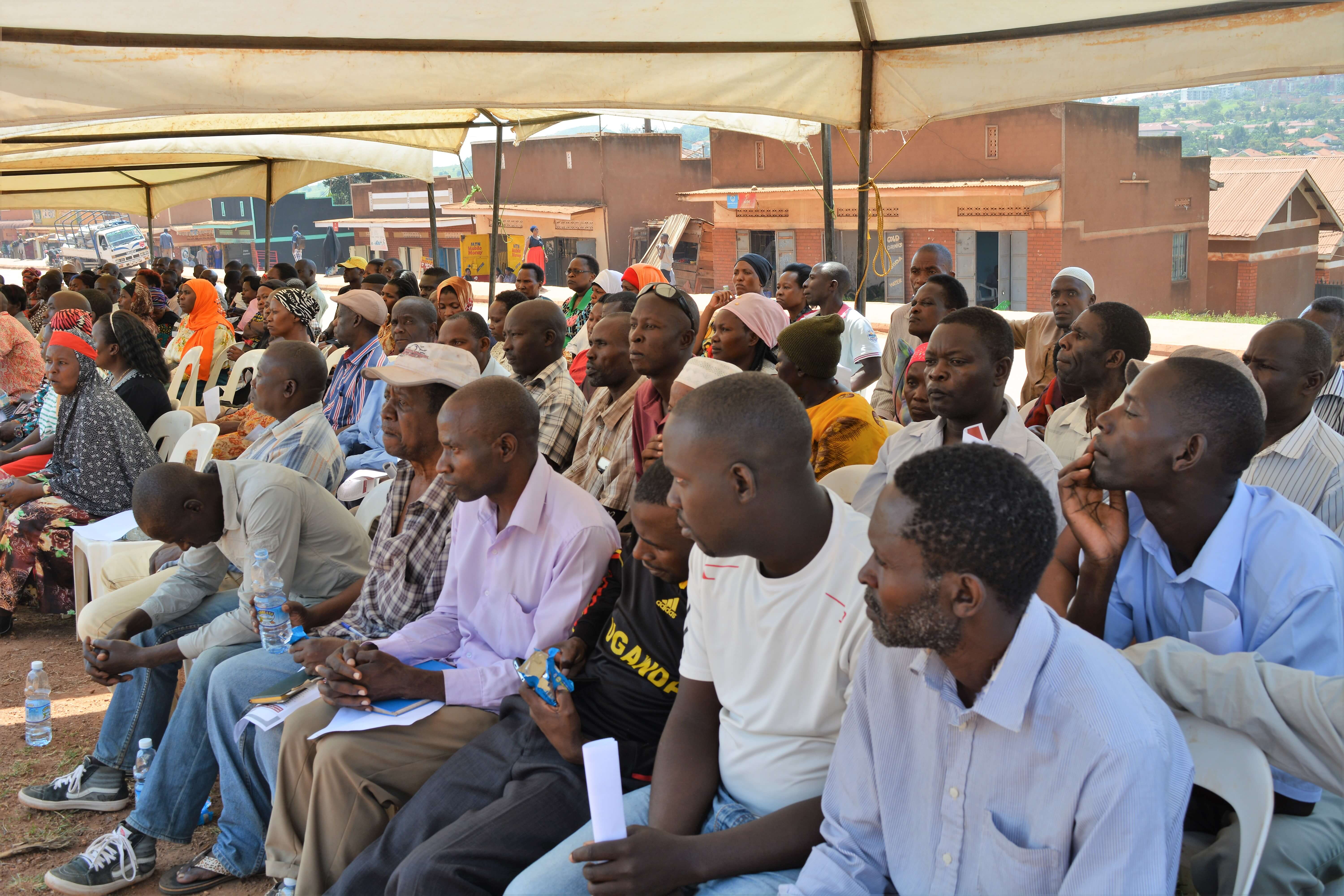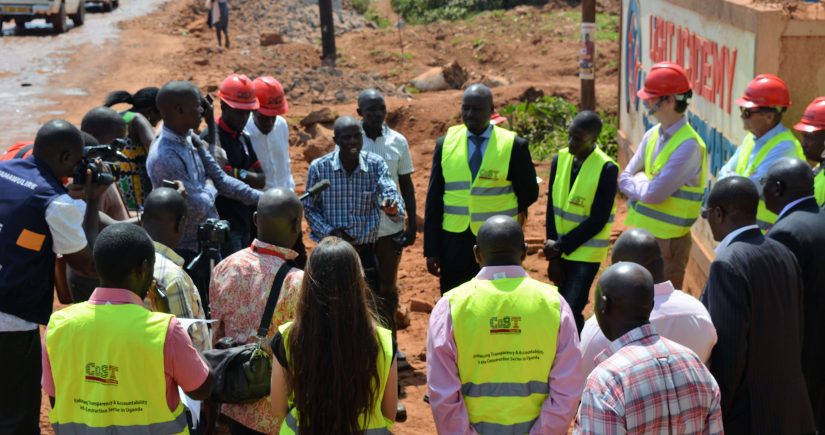In 2017 CoST Uganda began engagement with Wakiso District as part of its assurance process assessing data disclosure on the repair of a major road, Namasuba-Ndejje-Kitiko alongside other infrastructure projects in Uganda. In this blog, CoST Regional Manager for Africa, Olive Kabatwairwe reflects on Wakiso’s journey to enabling infrastructure transparency and how adopting the CoST approach improved trust between citizens and policy makers and had ripple effects across other regions.
Wakiso District has committed to CoST values and is now close to being a model district for CoST implementation in Uganda. But the outlook was not always positive, nor was progress so smooth. Our initial engagements were viewed with suspicion and when we began to engage the district in February 2017, it had no disclosure framework and many officials did not know how to or see the need to disclose information on infrastructure projects. The mindset was that citizens needed infrastructure, not information. This soon changed when the district saw the benefits of transparency following recommendations from CoST Uganda’s first assurance process, including the need for greater citizen participation and disclosure.
Initial perceptions of CoST
“The core (CoST) features of disclosure, assurance, multi-stakeholder working and social accountability sounded new, but we were ready to adopt them,” commented Luke Lokuda, Wakiso District Chief Administrative Officer. He continued, “CoST had good intentions. We hoped they would help us to promote transparency, accountability and value for money. However, there was a fear that CoST was coming to conduct an audit; others thought it was part of the Public Accounts Committee of Parliament or criminal investigators. It took time to build trust. We are now more open and unafraid of being asked questions by citizens.”
Despite initial reservations, the partnership paid off. The first assurance process showed that just over half of the points required by the CoST Infrastructure Data Standard (CoST IDS) to be disclosed at various stages of a project cycle were made available. Much higher rates are predicted for its second assurance process which is currently underway.
Samuel Mwesigwa, Wakiso District Engineer said, “CoST told us to go to the people, so that’s what we did. We started by improving our communications. Press coverage used to be negative, but through the assurance process we dug up old procurement files and, by disclosing more, especially on the Namasuba-Ndejje-Kitiko road, Wakiso has been able to attract a lot of good will from the population. Officials who initially viewed the process with suspicion are now more than happy to share information and coverage in the press has improved.”
The CoST Baraza: A turning point

To strengthen the relationship between authorities and citizens, Wakiso, like many other districts holds ‘Barazas’, a Ugandan tradition where different stakeholders come together for constructive dialogue as a way to hold decision-makers to account. CoST Uganda decided to use Barazas as a method to engage the public after CoST Honduras had demonstrated the success of using similar citizenship engagement methods.
In December 2017, CoST and Wakiso District organised a Baraza where the findings from the assurance report were shared with the local community. This included how citizens offered the land needed for drainage without compensation as it would reduce the risk of flooding their homes and businesses. Citizens then expressed desire for greater access to information and participation in infrastructure project delivery. They voiced concerns about the road project, ranging from a need for timely disclosure and citizenship involvement to greater consideration of pedestrian safety and bus and boda-boda motorcycle taxi stops. The district acted on these concerns by introducing street lights.
The Baraza changed how citizens viewed policy makers. District Engineer, Samuel Mwesigwa who has been working in Wakiso of or over five years said that previous Barazas were full of accusations and finger pointing: “The CoST Baraza was a turning point. It opened our minds to the relevance of involving citizens in infrastructure project delivery, from planning right through to completion and post-completion phases.”
Improving trust between the national and sub-national level
CoST’s involvement not only improved the relationship between citizens and decision-makers, but it also helped to improve the relationship between the Ministry of Works and Transport and the district. The district had limited capacity to manage the Namasuba-Ndejje-Kitiko road, so CoST raised awareness on their needs, promoting the Ministry to give the district much-needed road equipment. Not only did this improve efficiency on the road project, but it will help to see that future projects are delivered on time. Another key asset was helping the project to stay within its expected timeframe, when CoST engagement began, the design for the road had not been approved by the Ministry and no consultant had been put in place by the district to supervise the project. Following recommendations from the CoST, the Ministry swiftly approved the design and the district contracted a consultant to supervise the project.
The involvement of the Ministry was not only important to project efficiency, but it sent a strong message to Wakiso citizens that change is coming from the top down and that it is here to stay.
From a district to regional impact
The Wakiso District story is one that is now widely shared, it has been used to influence positive actions across other regions and in neighbouring Tanzania. CoST Tanzania intends to promote citizen participation through Barazas, and the Minister of Works and Transport, Tanzania has proposed a lesson learning exchange with Uganda.
CoST has also supported the municipal council of Makindye-Sabagabo in its delivery of a road project. Makindye-Sabagabo previously received funds from Wakiso District to manage the construction and repair of their roads. This did not always result in efficient delivery of their infrastructure projects and had consequences on the capacity and resources of Wakiso. Following CoST recommendations to improve their financial management skills, Makindye-Sabagabo was granted funding by the Ministry of Finance and are working independently to oversee their road projects and two others which are being assessed in the second assurance process. Similar experiences are being replicated across other districts which are experiencing a new wave of trust built between citizens and decision-makers by the active involvement of citizens.
Wakiso District proudly shares its story of how it moved towards infrastructure transparency and CoST Uganda is continuing to work closely with Wakiso, including by introducing its Infrastructure Monitoring Tool to the district and five others. Wakiso is now looking to source additional funding to deliver their ambitious strategic plan on infrastructure including the construction and repair of over 480km of roads and other structures, these will likely adopt the CoST approach to ensure full transparency and all its benefits.
To find out more about CoST Uganda please click here.
